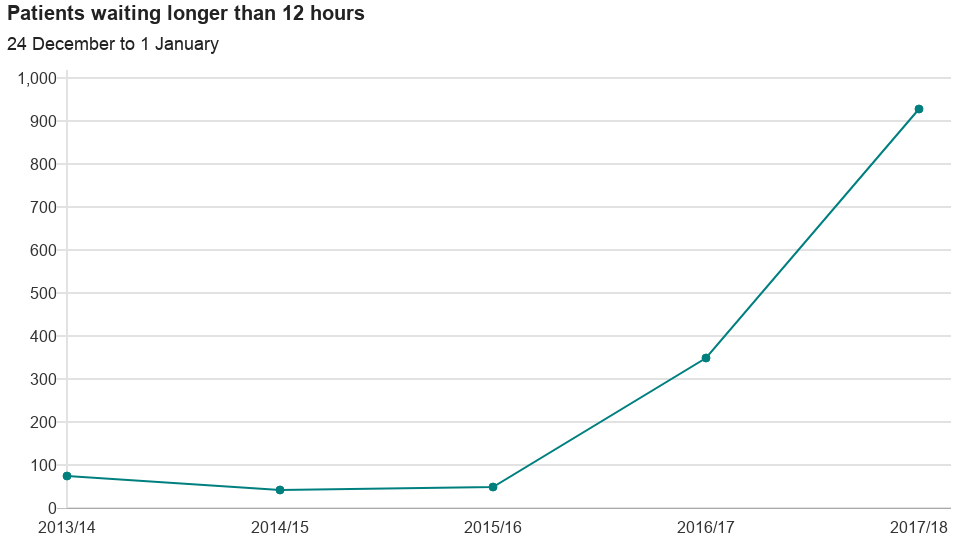Ulster Hospital patient waits 45 hours in A&E
- Published

The target states that no-one should wait longer than 12 hours to be treated, discharged or admitted
A patient had to wait 45 hours in the emergency department before being admitted to a ward in the Ulster Hospital.
It is understood the patient spent a considerable amount of that time on a trolley at the Dundonald hospital.
The target states that no-one should wait longer than 12 hours, external to be treated, discharged or admitted.
The BBC has learned that the Ulster Hospital breached the target 447 times in the past fortnight.
The number is slightly up compared to the same period last year.
The South Eastern Health Trust says it is operating under "tremendous pressure" and the patient was cared for in a dedicated nursing area.
All five health trusts have recently reported being under pressure.
While that is not unusual at this time of year, medics say it is concerning as temperatures have yet to plummet and the number of flu cases remains moderate.
One senior doctor has said the waiting time figures raised questions over what impact if any the ongoing transformation process was having on the health service.
Systemic problems, including recruitment, pay policy and creating a better work/life balance for staff were not being tackled by senior management in all of the health trusts and by Department of Health officials.

Analysis: Winter is coming

Since the start of the year, there has been a nine per cent increase in the number of adults attending the Ulster Hospital's emergency department, a seven per cent increase in the number of ambulances delivering patients and a five per cent jump in emergency admissions.
Just 20 additional beds are in place to cope with the extra demand at the hospital which clearly isn't enough.
In fact, a recent bed-monitoring exercise revealed that the health trust requires about 70 - 100 additional beds in order to meet demand.
There's the added problem of not enough nurses.
With about 1,800 nursing vacancies, even if there was additional money, according to the health trusts, they wouldn't have enough staff to attend additional beds.
Scheduled operations are also starting to be cancelled.
While that is all to be expected at this time of year, the health service is already starting to feel the pain and that is before winter really descends and everything that arrives with it.
All in all it is a very worrying situation.

A senior doctor in a different health trust has told the BBC that staff have been feeling "hammered" by work and were dreading the next couple of months.
The South Eastern Health Trust is particularly badly affected because of its increasingly older population.
More than 21% of residents in the area are over 65 - an age group that suffers more than others from flu and chest infections.
'Simply not enough'
"As we approach the busiest months of the year, we know that there will be a number of incredibly busy days and this will unfortunately mean longer waits for patients in our emergency departments," a trust spokeswoman said.
"We hope that you will bear with us in our endeavours to deliver safe care in as timely a fashion as possible. Our staff, who do a wonderful job on a daily basis, will continue to focus on delivering the highest quality care to the population we serve."
The trust added that there were other issues at play - "simply not enough" beds at the Ulster Hospital to meet demand and the "significant shortage" of registered nursing staff in Northern Ireland.
For a time on Tuesday night at Belfast's Royal Victoria Hospital (RVH), 10 ambulances queued outside the ED.
Paramedics had lengthy waits to hand over patients and for several hours some ambulances were diverted to the Mater Hospital in north Belfast instead.
In December, the Department of Health announced a range of measures, including opening an emergency care village at the Royal Victoria and launching a review of emergency care.
- Published5 January 2018
